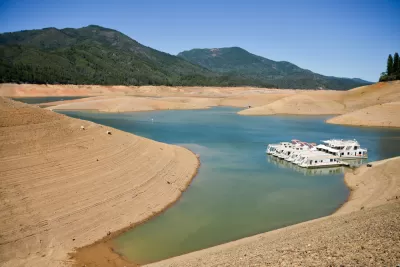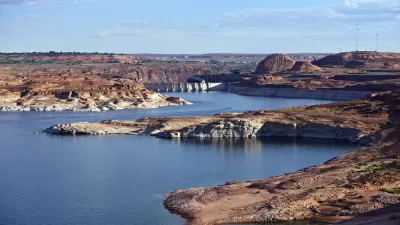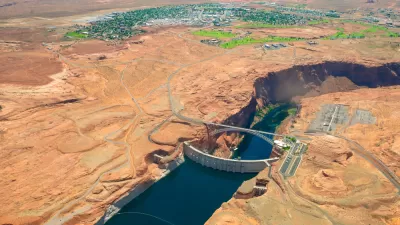Jeff Kightlinger, general manager of the Metropolitan Water District of Southern California, explains how the impacts of California’s historic drought are already changing the landscape of the American Southwest.

The largest water supplier in Southern California, Metropolitan Water District, oversees 19 million people, 14 cities, 11 water districts, and one county water authority. In the recent historic drought, the Metropolitan Water District (MWD) has made news for establishing the largest water conservation rebate program in the history of country: roughly $450 million in a two-year period with $350 million going to turf rebates and $100 million going to water-efficient home appliances. Going forward, MWD is looking to find even more creative solutions to conserving water and ensuring a sustainable future in Southern California.
General Manager Jeff Kightlinger joined The Planning Report to discuss how climate change impacts on California's water supply are requiring MWD to prioritize differently and move forward with zero expectations of available water.
As Kightlinger puts it simply: "climate change is very real, and we believe we are already seeing the impacts on our water supply." He explains how just the change to getting more rain and less snow can "alone can change everything from when water is available, to how we have to move it, to the best infrastructure for the job."
Kightlinger, a Governor’s appointee to the California’s Bay Delta Vision Blue Ribbon Task Force, also sheds light on MWD challenges and progress to restore habitat and increase biodiversity in the Sacramento-San Joaquin Delta. Finally, Kightlinger explains how MWD is engaging in ongoing discussions on the Colorado River, which is often referred to as the “lifeblood of the American Southwest including Mexico." The Colorado River has been in drought for the last 16 years, and Kightlinger explains that all stakeholders are all going to have to reduce our annual demands on the Colorado River. Kightlinger explains that California, Nevada, and Arizona, which make up the river’s Lower Basin, are "working on contingency plans to develop cooperative inter-state programs that will help each state mitigate and cope with the effects of the drought."
Read more about the future of Southern California's drought strategy in The Planning Report.
FULL STORY: Climate Change Impacts on California's Water Supply Require MWD to Prioritize Differently

Planetizen Federal Action Tracker
A weekly monitor of how Trump’s orders and actions are impacting planners and planning in America.

Maui's Vacation Rental Debate Turns Ugly
Verbal attacks, misinformation campaigns and fistfights plague a high-stakes debate to convert thousands of vacation rentals into long-term housing.

San Francisco Suspends Traffic Calming Amidst Record Deaths
Citing “a challenging fiscal landscape,” the city will cease the program on the heels of 42 traffic deaths, including 24 pedestrians.

Amtrak Rolls Out New Orleans to Alabama “Mardi Gras” Train
The new service will operate morning and evening departures between Mobile and New Orleans.

The Subversive Car-Free Guide to Trump's Great American Road Trip
Car-free ways to access Chicagoland’s best tourist attractions.

San Antonio and Austin are Fusing Into one Massive Megaregion
The region spanning the two central Texas cities is growing fast, posing challenges for local infrastructure and water supplies.
Urban Design for Planners 1: Software Tools
This six-course series explores essential urban design concepts using open source software and equips planners with the tools they need to participate fully in the urban design process.
Planning for Universal Design
Learn the tools for implementing Universal Design in planning regulations.
Heyer Gruel & Associates PA
JM Goldson LLC
Custer County Colorado
City of Camden Redevelopment Agency
City of Astoria
Transportation Research & Education Center (TREC) at Portland State University
Jefferson Parish Government
Camden Redevelopment Agency
City of Claremont




























